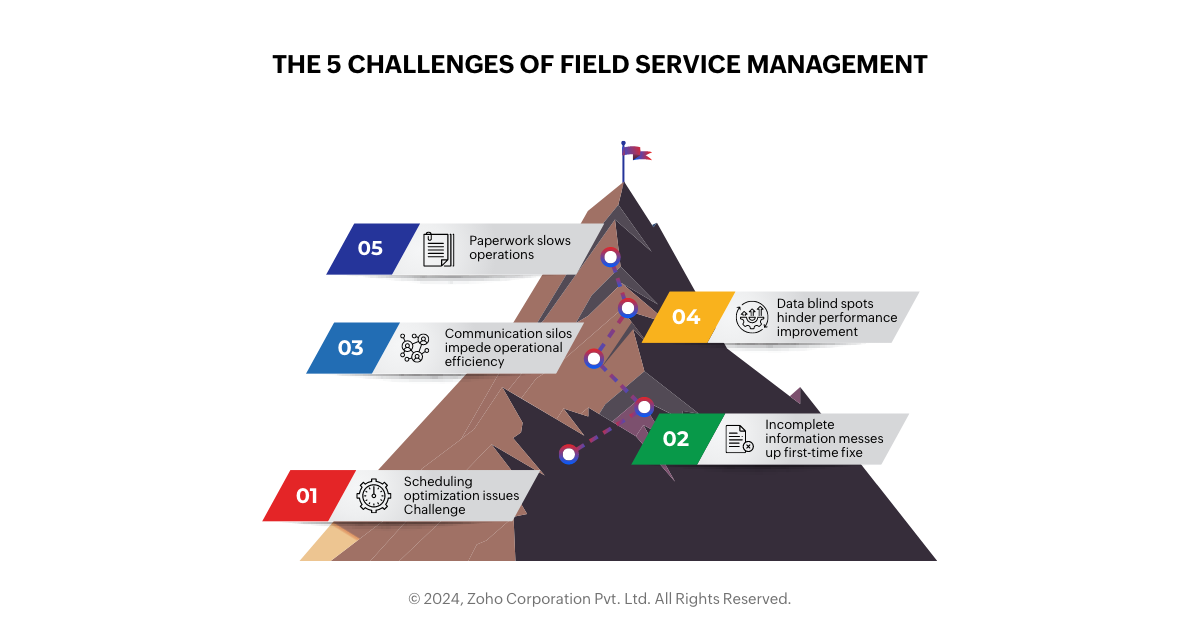Top 5 challenges in field service management and how you can solve them with low-code
- Last Updated: July 12, 2024
- 285 Views
- 5 Min Read

The global field service management market was valued at $5.2 billion in 2021, and it's projected to reach $29.9 billion by 2031. However, the complexities of field service management can leave even the most seasoned professional feeling overwhelmed. Juggling technician schedules, ensuring real-time visibility into operations, and maintaining seamless communication with customers present a constant challenge.
But did you know there's a way to overcome these hurdles without resorting to expensive custom coding solutions? In this blog, we'll dive into this and much more. But first of all, what is field service management?
What is field service management (FSM)?
FSM refers to the processes and technologies used to manage a mobile workforce that delivers services directly to customer locations. Field service managers play a crucial role in overseeing field service operations, ensuring that all aspects run smoothly. This can encompass a wide range of industries, from HVAC repair and pest control to appliance maintenance and internet installation. An effective FSM system optimizes scheduling, equips technicians with the necessary information, streamlines communication, and empowers data-driven decision making for continuous improvement.
FSM software plays a crucial role in addressing these challenges by improving agility, efficiency, and the customer experience. It helps visualize goals, assists with project management, and connects field technicians with customers, thereby enhancing operational efficiency.
Why consider low-code for FSM software challenges?
Traditional development approaches to FSM solutions can be costly, time-consuming, and inflexible. Low-code development offers a unique advantage for IT teams within FSM organizations. It allows you to build custom FSM solutions that address your specific needs without the extensive coding expertise typically required. This translates to:
Faster development and deployment: Drag-and-drop interfaces and prebuilt components within low-code platforms allow for rapid application development. This means you can build and deploy custom FSM solutions that address your specific needs quickly, helping you adapt to evolving business requirements and industry trends. Additionally, low-code development can significantly improve operational efficiency by streamlining tasks and enhancing coordination in field service activities.
Reduced development costs: Eliminate the need for expensive custom coding projects. Low-code development empowers citizen developers within your IT team to build FSM applications, freeing up resources for other strategic initiatives.
Scalability and future-proofing: Low-code applications are inherently scalable. As your business grows and your requirements change, you can easily adapt your FSM application to accommodate those needs. This future-proofs your investment and ensures your FSM system remains effective over time.
Citizen developer empowerment: Low-code platforms empower citizen developers within your IT team to build and maintain FSM applications. These individuals often have a deep understanding of the specific needs and challenges within the FSM domain. By leveraging their expertise, you can create highly targeted solutions that directly address your organization’s unique requirements. Moreover, integrating workforce management with low-code solutions can optimize field service operations by improving the scheduling process and enhancing the overall customer journey.
Challenges in field service operations and their low-code solutions

Challenge #1: Scheduling optimization issues
Traditional scheduling methods often lead to inefficiencies, with factors like technician location, skillsets, and real-time traffic data going unconsidered. This can result in missed appointments, wasted travel time, and ultimately, disgruntled customers. Field service personnel play a crucial role in delivering services efficiently by performing essential tasks at specific locations and providing skilled and specialized services to clients.
Low-code solution: Develop a custom FSM application leveraging low-code tools. These platforms allow you to build drag-and-drop interfaces that integrate seamlessly with existing systems. Imagine a scheduling interface that factors in real-time traffic data, technician skillsets, and proximity to optimize appointment allocation. Field service technicians benefit from optimized scheduling through low-code solutions, which provide appropriate access to inventory controls and streamline in-field tasks and deployment. This empowers dispatchers to make informed decisions quickly, leading to increased first-time fix rates and improved customer satisfaction.
Challenge #2: Incomplete information messes up first-time fixes
Incomplete or inaccessible information during service calls can lead to repeat visits, draining resources and hampering customer trust. Technicians often require access to past service history, relevant manuals, or even video tutorials while on-site.
Providing complete information to technicians not only improves their efficiency but also significantly enhances the customer experience by ensuring quicker and more accurate service.
Low-code solution: Design an FSM mobile application that provides technicians with comprehensive job information at their fingertips. This can include past service records, downloadable manuals, and even the ability to access instructional videos offline. Empowering technicians with the right knowledge at the right time ensures a higher first-time fix rate and reduces the need for repeat visits.
Challenge #3: Communication silos impede operational efficiency
Disjointed communication between technicians, dispatchers, and customers can lead to delays, misunderstandings, and frustration. Field service software plays a crucial role in improving communication by providing accessible and compatible tools for field use.
Low-code solution: Develop an FSM application with built-in communication functionalities. This could include real-time messaging, photo sharing capabilities, and automated notifications. Mobile workers benefit from real-time communication features in field service software because it allows them to share real-time customer and asset data and streamline their workflows. Technicians can update job status, request additional parts, and collaborate with dispatchers seamlessly. Automated appointment confirmations and technician progress updates keep customers informed, fostering trust and confidence.
Challenge #4: Data blind spots hinder performance improvement
Without clear data on technician performance, identifying areas for improvement and optimizing resource allocation becomes a guessing game.
Low-code solution: Utilize low-code development to craft an FSM application that captures key performance metrics like job completion times, customer satisfaction ratings, and part usage. This data can be visualized in real-time dashboards, enabling you to identify trends, recognize top performers, and provide targeted training for those who need it most. Tracking these performance metrics also helps in complying with service-level agreements, ensuring efficient resource allocation and minimizing travel time in field service operations. Data-driven insights empower informed decision-making, leading to a more efficient and optimized workforce.
Challenge #5: Paperwork slows operations
Manual paperwork processes are a time-consuming burden for technicians and create data silos for the back office. Field service workers, such as construction workers, electricians, and plumbers, can streamline their tasks using digital forms.
Low-code solution: Streamline these processes by building digital forms for work orders, invoices, and safety checklists within your low-code FSM application. Technicians can complete these forms on their mobile devices, eliminating paper waste and ensuring instant data capture. This empowers real-time data analysis and reduces administrative burdens.
In conclusion, the field service landscape presents a unique set of challenges that demand innovative solutions. By leveraging the power of low-code development on platforms such as AppCreator, IT departments within FSM organizations can transform these challenges from a chaotic scramble to a well-oiled machine, ensuring a more efficient workforce, happier customers, and a thriving business. Want to give it a try? Book a demo with us now!



